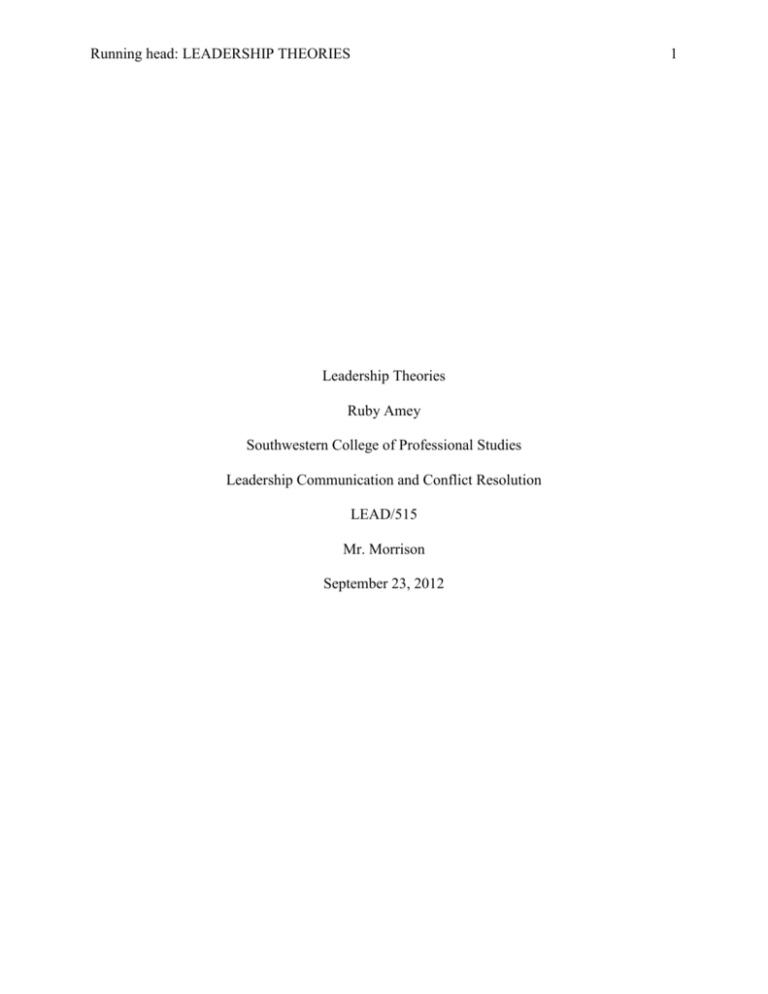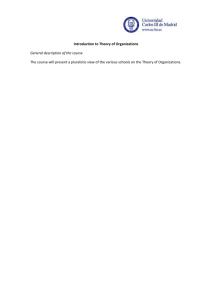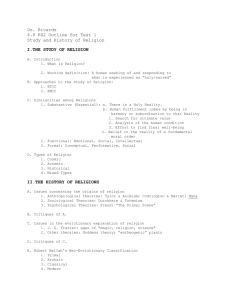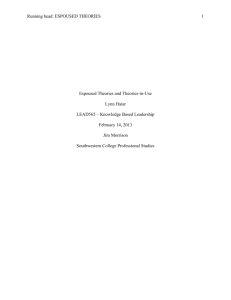Leadership Theories - Ruby Donaldson Amey`s Master`s of Science
advertisement

Running head: LEADERSHIP THEORIES 1 Leadership Theories Ruby Amey Southwestern College of Professional Studies Leadership Communication and Conflict Resolution LEAD/515 Mr. Morrison September 23, 2012 LEADERSHIP THEORIES 2 Abstract My intrapersonal, interpersonal, and leadership communication behaviors have direct effects on how my espoused theories and theories-in-use are developed. I believe my intrapersonal espoused theories come from my values and ethics, trust, self- awareness, and ethical decisionmaking. My interpersonal espoused theories come from these communication values emerging with unethical conflict. My leadership communication espoused theories come from my perception of people, understanding diversity, active listening, and feedback. My theories-inuse come naturally after obtaining the ability to have team- building, negotiation, managing conflict, and leading while empowering myself and others. LEADERSHIP THEORIES 3 Leadership Theories In order to talk about myself and how I am effective as a leader, I have to be self- aware of what is needed to develop my skills as a leader. In order to realize this potential, I need to use my intrapersonal, interpersonal, and leadership communication skills and behaviors. For example, I have ways in the commissary as a leader to change the lack of motivation in the workplace by offering incentives, merit promotions, and bonuses. Espoused Theories “Espoused theories are the accounts that individuals provide whenever they try to describe, explain, or predict their behavior”(Bolman & Deal, 1997). Intrapersonal My intrapersonal espoused theories come from the establishment of my values and ethics. Being able to trust can lead to loyalty in an organization. “The organizational context is likely to be a particularly important influence on individual ethical decision-making because "managers have more control over the work environment than they do over individuals' values or moral development" (Trevino et al., 1998, p. 447)” (Valentine & Barnett, 2002, p. 1). Intrapersonal Espoused Theories 1. If you have values and ethics, trust, self-awareness, and ethical decision-making you will establish good leadership goals. 2. If you micro-manage your employees you can intimidate them while keeping them from progressing in the workplace. 3. If you understand diversity, have effective team-building and training, you will cultivate good communication in the workplace. LEADERSHIP THEORIES 4 4. If you actively listen, negotiate with others, manage conflict, you will become a good coach and mentor. Theories-in-Use “Theories-in-use guide what people actually do. It is an implicit program or set of rules that specifies how people really behave,” (Bolman & Deal, 1997). Intrapersonal Theories-in-Use 1. People are tested by a choice of ethical or unethical interactions when the lack of money, greed, and goals are not being met are in leadership. 2. People that are micro-managed have a choice to withdraw from their abilities to do their work through less production in the workplace or do the right thing. 3. People have a choice of exercising their knowledge or lack of understanding of diversity, effective team-building and training, and communication. This makes people tend to succeed or fail in promotion, rewards, and accomplishing goals. 4. People that usually don’t listen, negotiate, manage their conflict, don’t become a coach or mentor. They have a choice to make when taking on leadership skills. Interpersonal My interpersonal espoused theories come from these communication values emerging from interpersonal conflict. For example, in the commissary, deadlines, tasks, and reports are done on a daily, monthly, quarterly, and annually basis. These days are busy with changes being applied to all departments. Employees tend to conflict and need to be led by my effectiveness to manage conflict by negotiation, training, by involving other employees in decisions, and offering an open door policy for complaints and suggestions. The military grocery business can get difficult. LEADERSHIP THEORIES Interpersonal Espoused Theories 1. If people are open to change, they will listen. 2. If people communicate with silence, they avoid other ideas. 3. If people understand the issues, control their temper, engage in negotiation they will avoid conflict. 4. If people use competition, avoidance, accommodation, compromise, and collaboration, they will develop conflict management strategies. Interpersonal Theories-in-Use 1. People selective listen, perceive what they want based on their own knowledge of the situation. 2. People encode, decode, and interact accordingly to spoken communication. 3. People avoid conflict by withdrawing, intervention, clarifying the issues, and clearing up confusion. 4. People use competition, avoidance, accommodation, compromise, and collaboration, to develop conflict management strategies. Leadership Communication Leadership communication is crucial to the operations, productivity, and success of any organization. My leadership communication espoused theories come from my perception of people, understanding of diversity, actively listening, and feedback. My theories-in-use come naturally after obtaining the ability to have team-building, negotiation, managing conflict, and leading while empowering myself and others. For example, in the commissary, it is a diverse group of employees with different cultures. To give directions and training, I have to be able to know what all the cultures and diversity entails. Some employees can barely speak English 5 LEADERSHIP THEORIES 6 enough to understand directions. I once had to take French lessons because we employed a lady who married a military member. She was hired by the commissary but spoke a cross language between French and Spanish. I was amazed at how much English she learned over a two year span. Communication was tough to say the least. I became very understanding. Leadership Communication Espoused Theories 1. If people want good leadership skills, then they will have a good perception of people through communication. 2. If people understand cultural diversity, language barriers can be changed. 3. If people actively listen, then information can be decoded. 4. If feedback is answered then employees and leaders have empowerment. Leadership Communication Theories-in-Use 1. People use good perception skills by communication with through good leadership skills. 2. People use cultural diversity to their advantage by receiving training in other cultures, ethnicity, while taking language classes. 3. People behave by deciding what should be listened to or not, blocking out valuable information. 4. People follow empowered leaders because they listen to feedback and make changes. My Plan for Implementing Improvement I plan to be a Charismatic Leader. “Charismatic leaders are characterized by an assured, supportive, argumentative, precise, and verbally non-aggressive communication style” (De Vries, Bakker-pieper, & Oostenveld, 2010, p. 376). For example, in the commissary I have always been a coach and a mentor to other employees while being a good leader. If an employee needed help with learning anything, I was willing to train them at any time. The best employees LEADERSHIP THEORIES 7 are the ones that are eager to learn different jobs. This can lead to management internships in the commissary management field. I plan to train my employees on leadership skills, perceptions of other people, effective communication, language barriers, and empowerment skills. This is while I implement changes myself. These changes are as follows: 1. I will start by giving a class on Leadership Skills with ethics and values, the types of leadership styles, and leadership qualities. I will work with other employees who want to become leaders. I will mentor and coach new potential leaders by showing them the operations, planning, progress reports, financial reports, and training. 2. I will implement better skills at changing my perception of others. I can do this by changing my view of others by learning more cultural differences through diversity. I will focus more on motivating others, analyzing what others need or want, think before perceiving actions of others, and interact with as many workers as possible. I will implement changes by stopping prejudices such as attitudes between younger and older employees. I will change my stereotypes that I have such as all women know how to clean. I have heard gender stereotypes such as men work harder. This is not true because women can multi-task better and faster. This would affect resolution of conflict. Another stereotype is men deserve higher pay. This is also not true. Workers deserve equal pay according to the job title. Women cannot work if they have babies. This is not true. Women are better at multi-tasking work, family, and education. Older workers take too much time off. I believe this is not true. They do not take time off at all unless their health is in jeopardy. Men see women as not progressing at the workplace as fast as them, they do not want to pay them equal pay, and have a glass ceiling that women cannot cross. Women want equal pay and higher positions. Some cultures believe that women are only here to have children and do not have the right to have a job. Empathy should be used in these cases to change the way LEADERSHIP THEORIES 8 women are viewed. We want equal rights, more pay, and to cross the glass ceiling. At my past job in the commissary, I believe women could be in higher ranks and were treated with empathy in conflict. Men in management now hire more women as CEOs for large companies. Management was not ruled by men or cultural issues in conflict. 3. I will provide effective communication by receiving the message, encoding it, decoding it, and giving good feedback to all e-mails, texts, and interaction with all co-workers. If an employee or a customer has a problem, I will address the problem through assertive communication by being fair, direct, sensitive, and honest. I will come up with an immediate answer. I will show interest in their problems, ask questions if they seem to not understand, avoid distractions, do not interrupt, be empathetic, correct misinterpretations, evaluate messages after hearing all the facts, concentrate on the message as well as the messenger, give feedback to check accuracy, listen with your body, and do not talk as much. 4. I will change language barriers by encouraging more employees to take language classes. I will also have meetings where other employees can share some of their different language translations. I have been working on my Spanish language skills. The more languages I learn the better I will be. This helps other employees to understand what is being said to others. The work environment can be free of conflict over problems and situations such as details and tasks of the jobs that the language barrier is affecting. 5. I will implement empowerment skills to all employees by teaching them about when to use empowerment and how be effective in politicking in the workplace. I will also teach employees when not to politic in the workplace. I also will change my barriers to effective listening by not using selective listening. I know that I need to work on this as a manager because with all the distractions with customers in the commissary, I have to listen more closely. I can be talking to a LEADERSHIP THEORIES 9 customer who needs something and at the same time have an employee come up who needs another thing done. Sometimes they have only a question to ask. For example, if I am in a rush I will hear what the customer says and not hear the employee at all. Then a few minutes later, he or she will come up to me again for the answer to whatever they were asking. I am going to spend more time working on questions that are frequently asked like for instance. Where is the break room? How can I get my schedule? What training classes can I take? When can I go on leave? What deadlines are we focusing on today during our work day? I have worked out a calendar for what tasks we are working on during weekdays. I have decided to get help for customers who wander the floor asking for special questions like how can we order this item in the Grocery Department? Time management would help me to focus more on my job. Conclusion In conclusion, my intrapersonal, interpersonal, and leadership communication behaviors have direct effects on how my espoused theories and theories-in-use are developed. I believe my intrapersonal espoused theories come from my values and ethics, trust, self- awareness, and ethical decision-making. My interpersonal espoused theories come from these communication values emerging with unethical conflict. My leadership communication espoused theories come from my perception of people, understanding diversity, active listening, and feedback. My theories-in-use come naturally after obtaining the ability to have team- building, negotiation, managing conflict, and leading while empowering myself and others. In order to have a great team and followers at work I have to be a competent, strong, and knowledgeable leader open to change and decision-making. Changes can be implemented to help other employees be trained to do other jobs in the workplace. More leaders will derive from this change for the future. LEADERSHIP THEORIES 10 Reference Bolman, L.G., & Deal, T.E. (1997). Reframing organizations: artistry, choice, and leadership. and Francisco, CA: Jossey-Bass, Inc DeJanasz S., Dowd K., Schneider B. (2009). Interpersonal Skills in Organizations 3rd Ed. Columbus, OH: McGraw-Hill. De Vries, R.,E., Bakker-pieper, A., & Oostenveld, W. (2010). Leadership = communication? the relations of leaders' communication styles with leadership styles, knowledge sharing and leadership outcomes. Journal of Business and Psychology, 25(3), 367-380. doi: 10.1007/s10869-009-9140-2 Valentine, S., & Barnett, T. (2002). Ethics codes and sales professionals' perceptions of their organizations' ethical values. Journal of Business Ethics, 40(3), 191-200. Retrieved from http://ezproxy.sckans.edu/login?url=http://search.proquest.com/docview/198023458?acco untid=13979






